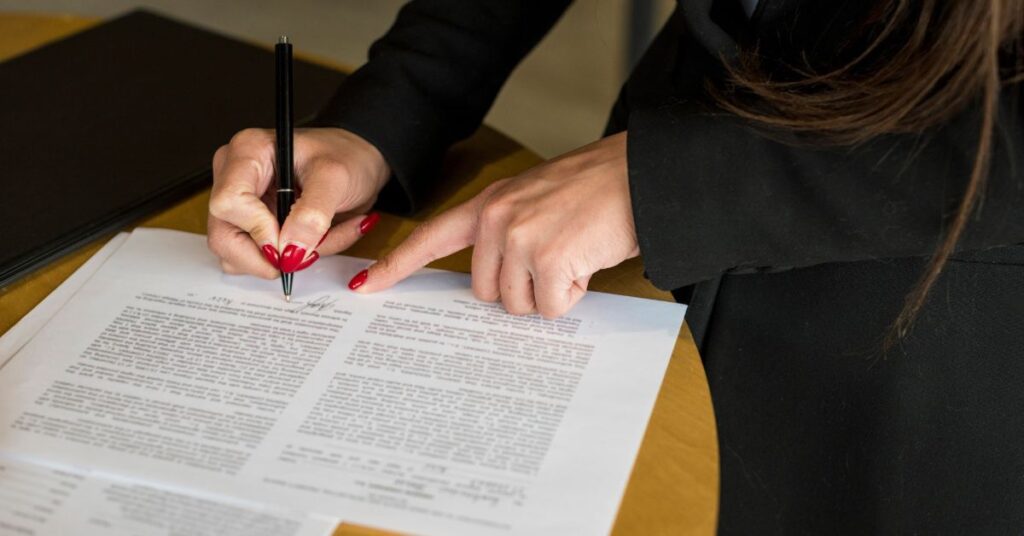If you are planning to sell or purchase property in Indonesia in the near future, it is crucial to understand the legal documentation process involved in such transactions.
The sale and purchase of a house or other property requires a series of legalisation processes that necessitate the assistance of a lawyer or public official in the legal field, one of which is a Notary Public. Notary Services.
In this article, Lets Move Group will discuss the role of a Notary Public in property transactions in Indonesia, starting from their authority in handling property documents, the validity of transactions with or without the presence of a Notary Public, and a breakdown of the potential costs involved. Let's take a closer look!
What is the role of a Notary Public in a house sale and purchase transaction?
A Notary Public plays a crucial role in a house sale and purchase transaction. They ensure that the process is legally valid and secure for all parties involved.
The following are the key roles of a Notary Public:
Examining the Legality of Documents
A Notary Public will examine all relevant documents, such as land certificates, building permits, property taxes, and others, to ensure their validity and that there are no disputes.
Drafting the Deed of Sale and Purchase (AJB)
The AJB is an official document that contains the sale and purchase agreement between the buyer and seller. A Notary Public ensures that the AJB is drafted in accordance with regulations and includes all important information, such as:
- The identities of the buyer and seller
- The object of the sale (address, land area, building)
- The purchase price
- The payment method
- The rights and obligations of the buyer and seller
Registering the AJB with the National Land Agency (BPN)
A Notary Public registers the AJB with the BPN to transfer the title of the land certificate to the buyer's name.
Representing Clients in the Sale and Purchase Process
A Notary Public can represent their clients in the negotiation process, signing of documents, and settlement of the transaction.
Providing Legal Advice
A Notary Public can provide legal advice related to the house sale and purchase transaction, such as the rights and obligations of the buyer and seller, taxes, and others.
Storing Important Documents
A Notary Public stores important documents related to the sale and purchase transaction, such as the AJB and power of attorney, to ensure security and easy access in the future.
Notary and PPAT Services: What's the Difference?
When buying or selling property, you may require the services of a notary and a PPAT. But do you know the difference between the two?
A notary is a public official who is authorised to create authentic deeds and has other powers. An authentic deed is a valid form of evidence according to the law.
PPAT stands for Pejabat Pembuat Akta Tanah (Land Deed Making Official). A PPAT is a public official who is specifically authorised to create authentic deeds concerning legal acts related to land.
| Notary Services | PPAT |
| Creates authentic deeds for various legal acts, such as sale and purchase, gifts, inheritance, agreements, etc. | Creates authentic deeds for legal acts related to land, such as land for sale and purchase, land inheritance, transfer or land rights, etc. |
| Legalises signatures and provides certified copies of deeds. | Registers the transfer of land rights to the National Land Agency (BPN). |
So, is it possible to sell or buy a house without a notary?
The process of selling or buying a house is an important transaction that involves many legal aspects. The role of a notary as a public official authorised to create a Deed of Sale and Purchase (AJB) is often considered essential in this process.
However, the question arises, can the process of selling or buying a house be carried out without a notary? The answer is yes, but with some important notes and consequences to consider.
Requirements for selling or buying a house without a notary
Based on Article 1338 of the Civil Code (KUHPerdata), an agreement made in writing and signed by both parties has the same legal force as an AJB made by a notary.
- Both parties must have legal capacity (be of adult age and mentally sound).
- The agreement must be made voluntarily without coercion.
- The content of the agreement must be clear and not contrary to the law.
Process of selling or buying a house without a notary
- Sales and Purchase Agreement (PJB): Create a written PJB that contains all the important points of the transaction, such as the identity of the parties, the object of the sale and purchase, the price, and the payment method. Make sure the PJB is signed on a stamp by both parties.
- Handover: Carry out the physical handover of the object of the sale and purchase and related documents, such as the land certificate. Create a handover report signed by both parties.
- Transfer of Ownership Registration: Change the name of the land certificate at the National Land Agency (BPN) to the name of the buyer.
Risks of selling or buying a house without involving a notary
- A transaction without a notarial AJB is more likely to experience legal disputes in the future.
- PJB without a notarial AJB has weaker evidential force in the eyes of the law.
- Transactions under Rp50 million are exempt from the obligation to create a notarial AJB.
Selling or buying a house safely and securely with a notary
Involving a notary in the process of selling or buying a house is highly recommended because it offers many advantages.
- The Deed of Sale and Purchase (AJB) created by a notary is legally valid and guaranteed.
- The notary checks the completeness and validity of all related documents.
- Minimises the risk of fraud and disputes in the future.
- Assists in the negotiation process and creation of the PJB.
- Handles the process of changing the name of the certificate at BPN.
- Saves you time and effort.
- Provides legal advice and the best solutions.
Steps for selling or buying a house with a notary:
- Document Check
- Sales and Purchase Agreement (PJB): created by a notary/legal consultant and signed by the buyer and seller.
- Deed of Sale and Purchase (AJB): created by a notary and signed in the presence of a PPAT.
- Registration of AJB to BPN: the notary registers the AJB with BPN to change the name of the certificate.
- Payment of taxes: the buyer and seller pay taxes according to the regulations.
Breakdown of Property Sale and Purchase Costs with a Notary in 2024
Here is an estimated breakdown of the cost of buying and selling property with a notary in 2024:
1. Biaya Sertifikat
Biaya ini bervariasi tergantung jenis dan nilai properti, berkisar antara Rp50.000 hingga Rp1.000.000.
PPH Fee
Here is an estimated breakdown of the cost of buying and selling property with a notary in 2024:
3. Tax Validation Fee
This fee amounts to 0.5% of the property's NJOP (Government-determined property value) and is used to verify the NJOP and Land & Building Tax (PBB) records.
Sale and Purchase Agreement (AJB) Fee
The notary fee for drafting the Sale and Purchase Deed (AJB) typically ranges from 0.5% to 1% of the agreed transaction value.
5. Fees for SKHMT, APHT, and Other Legal Documents
These charges vary depending on the type and number of documents required for the transaction.
6. Certificate Name Transfer Fee
The fee for transferring the certificate of ownership at the Land Office (BPN) is generally around 0.5% of the NJOP.
Total Cost Breakdown
When all legal and notarial costs are combined, the total can reach between 5% and 7% of the property’s transaction value.
Cost-Saving Tips When Using a Notary for Property Transactions
- Hire a legal consultant to assist with negotiations and ensure you're only paying what's necessary.
- Request a detailed breakdown of fees from the notary before the process begins—transparency avoids surprise charges.
- Look out for discounts or promotional packages—some notaries offer these, especially for first-time buyers or repeat clients.
Buy and Sell Your Home with Notary Partner at Lets Move Group
Buying or selling a home is one of life's biggest decisions. The process can be complicated and full of questions, especially regarding legalities and paperwork. This is where Lets Move Group comes in to help you!
Lets Move Group works with trusted notary partners to ensure your home buying and selling process is safe, smooth and hassle-free.
More than just notarisation, Lets Move Group also offers:
- Our legal consultant team is ready to answer your questions and provide the best solutions for your legal needs.
- We help you find a home that suits your needs and budget.
- Lets Move Group has an extensive network of trusted professionals, such as property agents, banks and contractors, to assist you at every stage of the buying and selling process.
Contact Lets Move Group sekarang dan wujudkan mimpi rumah idaman Anda!












